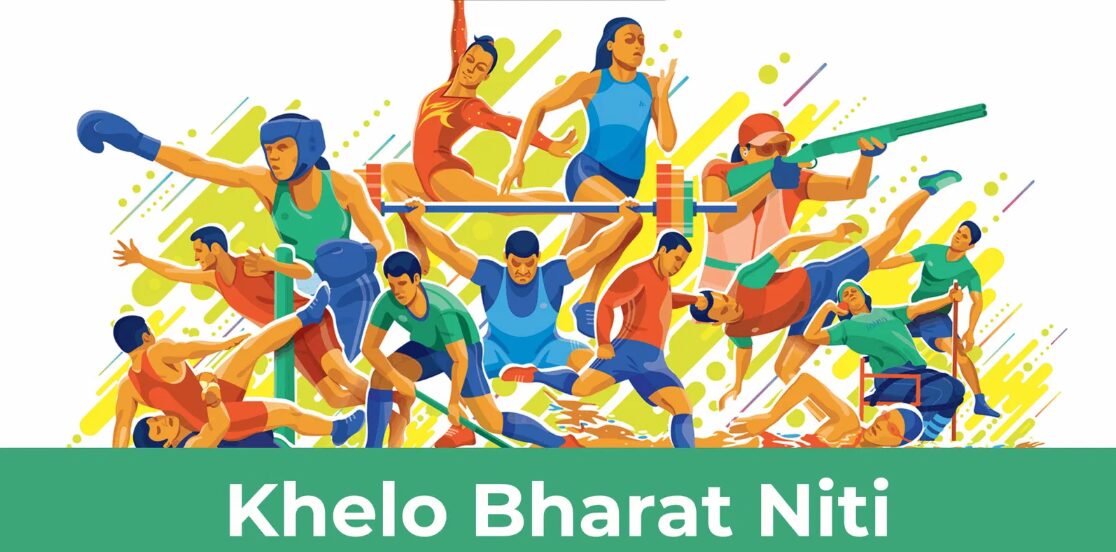Call Anytime +91-9212799477

KHELO BHARAT NITI & NATIONAL SPORTS GOVERNANCE BILL 2025
KHELO BHARAT NITI
-
Khelo Bharat Niti 2025 (also called NSP 2025) replaces the 2001 sports policy, marking a major re‑imagining of India’s sporting landscape—viewing sport as a driver for economic development, social inclusion, and national progress under the broader Viksit Bharat 2047 vision.
-
It positions sports as a legitimate profession and part of national identity—not merely extracurricular, but central to nation‑building.
#Khelo Bharat Niti rests on these foundational pillars:
-
Global Sporting Excellence: Early talent identification, high-performance coaching, integration with sports science, tech, and elite training pathways.
-
Sports for Economic Development: Promoting sports tourism, startups, equipment manufacturing, global events, and robust PPP/CSR funding models.
-
Social Impact through Sport: Driving inclusion of women, tribal and marginalized groups, Indigenous games revival, and community empowerment.
-
Mass Participation & Fitness (People’s Movement): Creating a culture of activity through accessible infrastructure, fitness campaigns, leagues, and local engagement.
-
Integration with Education (NEP 2020): Embedding Physical Education in school and college curricula with trained educators to foster early talent and dual career pathways
NATIONAL SPORTS GOVERNANCE BILL 2025
1. Establishing a Legal Framework
-
Replaces the 2011 Sports Code—which was non-statutory and ineffective—with a robust, enforceable legal framework to reduce judicial overreach and administrative chaos.
-
Aims to streamline governance, reduce litigation, and bring coherence to sports administration.
2. National Sports Board (NSB)
-
A central regulator akin to SEBI for sports, responsible for recognizing, suspending, or derecognizing National Sports Federations (NSFs), including the BCCI.
-
Also tasked with issuing Codes of Ethics, Safe Sports Policies, conducting inquiries into misuse of funds, and setting governance standards
-
Appointed via a search‑cum‑selection committee comprising top officials, administrators, and decorated sportspersons.
3. National Sports Tribunal (NST)
-
A dedicated quasi‑judicial body with civil court powers to handle sports disputes—covering elections, selections, and financial issues—with appeals permitted only to the Supreme Court (or CAS, if required).
-
Aims to expedite justice and reduce court backlog.
4. National Sports Election Panel
-
Oversees and ensures free, fair, and transparent elections across sports bodies and their affiliates.
5. Transparency & RTI Compliance
-
All properly recognized sports bodies (including BCCI in principle) are designated as public authorities under the RTI Act, subject to transparency.
-
Amendment: RTI applies only to sports bodies receiving government funding—effectively exempting BCCI, given its financial independence.
6. Inclusive & Accountable Governance
-
Executive Committees limited to 15 members, required to include:
-
At least 4 women
-
At least 2 sportspersons of outstanding merit, and athlete representation generally (10–25%)
-
7. Age and Tenure Limits
-
Leaders (President, Secretary General, Treasurer) limited to three consecutive terms (12 years) with a mandatory cooling-off period.
-
Age cap set at 70 years, extendable to 75 if sanctioned by international charters.
8. Safe Sport & Ethics
-
Implements a Unified Code of Ethics and a Safe Sports Policy to protect women, minors, and vulnerable groups, alongside in-house grievance processes.
9. Institutional Structure of Sports Bodies
-
Federations must maintain:
-
A General Body
-
A 15-member Executive Committee
-
Dedicated Ethics, Dispute Resolution, and Athletes’ Committees.
-
10. Government Powers & International Compliance
-
Government retains authority to grant exemptions, issue directives, and form ad-hoc bodies during governance failures.
-
Strong emphasis on alignment with Olympic, Paralympic, and international charters.
11. Strategic Goal
-
These reforms are key enablers for India’s ambition to host the 2036 Summer Olympics, signaling international-standard governance and athlete welfare
Privacy Policy | Terms & Conditions | Refund Policy
© Copyright 2024 by PEFINDIA.org | Designed & Developed By CraftyWebbies
